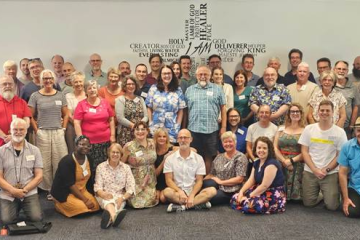The Family of God – Mark 3:20-35
May has been a wild ride, hasn’t it! That’s how I’m describing it in my pastor’s report for the church meeting today! And our Bible readings for May Mission Month have also described episodes in Mark’s gospel that are, in turn, dramatic and exciting and difficult, from the immediate call to Peter, Andrew, James and John in Mark 1, to the raising of Peter’s mother-in-law – egeiro – and “the whole city” (verse 33) landing on his doorstep, to today’s reading when “the crowd came together again” and Jesus and his newly minted disciples (verses 13-19) are confronted with a triple threat; the crowd who have gathered, Jesus’ own family and the scribes – not just the local scribes who had questioned his behaviour before, but “scribes who came down from Jerusalem”, serious scribes, big shot scribes. And in response to all this, we have Jesus’ declaration, “Whoever does the will of God is my brother and sister and mother.” Or as the May Mission Month notes say, “It is people partnering together to bring love, hope and peace to a broken and troubled world [who are] …the family of God.”
If you are interested in the literary features of the text (and I know that many of you are – the Bible Book Club in on this week!) this passage, Mark 3:20-35, has what is called a chiastic structure – from the Greek word for ‘crossing’ – where the pattern in the text is repeated, but in reverse.
· So, in verse 20 we have the crowd re-gathering.
· In verse 21, Jesus’ family who hear about it and come “to restrain him.”
· In verse 22, the scribes from Jerusalem who declare Jesus in league with the devil! In fact, the ruler of the devils – Beelzebul or Satan.
· And then, in verses 28-30, we work backwards, addressing first the scribes and condemning them for mistaking the Holy Spirit for Satan.
· Then, in verse 31, Jesus’ family,
· and, finally, in verses 32-35, we return to crowd who are now sitting around him, which is a position we should recognise as the position of disciples.
This structure is also referred to as a Markan intercalation or Markan sandwich! And at the centre is the substance, the central gospel message, verses 23-to 27, that the liberating, lifegiving reign of God has come to overthrow the life-destroying reign of Satan, that Jesus will “bind up the strong man” and plunder his house; that House Satan will fall to the household of God!
I am, however, fascinated by how each group – crowd, family, scribes – are presented here and how this relates to our – recent – experiences of mission, of being part of God’s liberating, lifegiving reign in this wild May Mission Month!
Firstly, there is the crowd, who are ever-present in the gospel of Mark. (The word crowd appears in 14 of the Gospel’s 16 chapters.)
Even in chapter 1, where the word doesn’t appear, we have, as we’ve noted, “the whole city…gathered around the door.” Later because “everyone is searching for [him]” (verse 37) he can “no longer go into a town openly” (verse 45). In Mark 2 the crowd is so thick four desperate people break through a roof to get a man to Jesus. In Mark 3 Jesus has a
boat on standby to avoid being crushed. And at the start of today’s reading, and in Mark 6:31, we’re told that the constant demand of the crowd did not even give Jesus and his disciples time to eat!
The crowd – the representation of our broken and troubled world – are not a benign presence in Mark. At the end of the gospel, it is the crowd who arrest Jesus (Mark 14:43) and it is the crowd, in Mark 15, who call for his death.
And yet in Mark 6:34 we’re told that Jesus, seeing the crowd – the crowd he was trying to escape – “had compassion for them, because they were like sheep without a shepherd,” and chooses to teach and feed them. And here in our reading the crowd morph from a mob at the door to disciples sitting at his feet, those identified as doing the will of God, those identified as God’s family.
We haven’t quite had crowds knocking down the doors of the church or so many newcomers we haven’t had time to eat (there’ll be morning tea after the service today!) And the media attention really only lasted a week. But I cannot get over the number of emails we’ve received or the number of conversations I’ve had – here at the Community Centre or in the community or at my daughter’s primary school best friend’s father’s funeral that Aron and I went to last weekend – a woman rushed up and hugged me at Kingston Shops the other day! And many of you have told me about messages from friends or friends taking credit for knowing you or adult children telling you, “Good on you, you progressive oldies.” (And youngies as well!)
All of this is exciting! And all of this is challenging! Will we make space for new people? Will we have compassion for them, especially those like sheep without a shepherd? Will we be open to the gifts they bring? Will we live the commitment – long after the banner comes down – that all are welcome in this place?
Secondly, in this passage, Jesus is confronted by his own family. Perhaps, they were seeking to protect Jesus (to ensure that he actually ate something!) or to protect themselves, but the verb used here – his family “went out to restrain him” is the same verb used for John the Baptist’s arrest in Mark 6:17, and for Jesus’ arrest in Mark 14. They believe what the people are saying that he is out of his mind.
The statement Jesus makes in verses 33 and 34 is dramatic. Harsh even. “Who are my mother and my brothers?” “Here are my mother and my brothers!” And the scene is dramatic too. It is Jesus’ closest relatives, his mother and his brothers, who are outside the house (verse 31), who are now outsiders, and it is the crowd sitting around him who Jesus calls his family, who are now insiders!
We can’t underestimate the importance of this passage for the early Christian community; for people whose call to faith meant rejection by their families and perhaps their society. But this phenomenon is not limited to the first few centuries of the church. In every age, people have found a new family in the Christian community and felt the real pain of rejection from their natural family or other groups.
As part of our Assembly presentation on the 3rd May, Stephen Tang said: “Please consider the harm that would result from this intentional act of exclusion. As a
psychologist, I see that exclusion is one of the most intense and painful acts that people can inflict on each other. It harms both the excluded and those who do the excluding. Healing from the trauma and dislocation that follows can take a lifetime.”
But more important than his family, for Jesus, was the gospel message, sitting at the centre of this passage, of the coming of the reign of God: people freed from oppression; people experiencing healing; people finding wholeness; people’s dignity being acknowledged; people finding a new family – in the family of God. No wonder when he asks the question, “Who are my mother and my brothers?” He answers it, “Here are my mother and brothers! Whoever does the will of God – whoever seeks to live within the reign of God with me – is my brother and sister and mother.”
You know – I’ve mentioned before – that, like many of you, I have a lot of Baptist relatives! I am related to both the Chair of Assembly Council and the Director of Ministries, who officiated over this disaffiliation process, which has brought another level of pain and discomfort to the process.
So, I went to Assembly with some trepidation, but at the registration desk I was tackled from the side in a big hug by a cousin who is also a Baptist minister. “I just wanted to give you a hug,” he said. I wasn’t sure how to interpret that. “And I need to tell you this is a terrible business and I just grieve for our Association.” That was easier to read.
We chatted for a bit and then went and sat down and then there was all the hurly burly of the debate and the disaffiliation and I didn’t see him to say goodbye.
So, I texted on the Monday afterwards to thank him for the hug and say how much it helped. “It’s very lovely,” I said, “to know I’m not rejected by my whole family.”
“Oh Belinda,” came the response, “I left before the final outcome because I could not stop my tears. The contrast between the presentations by both churches and the support expressed from so many, and the inevitable outcome was tragic. And then last night I watched your service yesterday – what a powerful witness of graciousness, forgiveness and love which you all expressed. That is the kind of church that does draw people in to hear about Jesus and one I would love to join – so thankyou…for your…leadership and for your church community who showed what it does mean to be more like Jesus. You have shown in a powerful way how a follower of Jesus lives, and I am so thankful I witnessed this and learnt from you.
And, yes, our family is a weird bunch…. But you are stuck with me, I’m afraid.”
‘Graciousness, forgiveness, love, a community that draws people in, that welcomes people in, a community that shows what it means to be more like Jesus.’ If anyone asks me the question, “Who are my mother and my brothers?” I, too, will answer, “Here are my mothers and brothers and my sisters and my fathers! Whoever does the will of God – whoever seeks to live within the liberating and life-giving reign of God – is my brother and sister and father and mother.” And you, as my family in God, are stuck with me too, I’m afraid!
Finally, there is Jesus’ confrontation with the scribes! As I mentioned before these are the heavyweight scribes. And in Mark 8:31, 14:43, and 15:31 they play a role beside the other religious leaders in Jesus’ arrest and trial and crucifixion. The reference to them here hints at that ultimate conflict.
The description of their visit is added to this story of Jesus’ family so the two scenes can interpret one another, emphasising the huge personal mistakes and theological mistakes that each group makes in not recognising the work of the Holy Spirit in Jesus’ ministry – in labelling him mad, bad and dangerous.
But the scribes receive the greater condemnation for mis-identifying the Holy Spirit as Satan; for not seeing the liberation of people’s lives, the healing of people’s lives, the making whole of people’s lives and the restoration of people’s dignity as Holy Spirit work.
I don’t think we have encountered any real religious heavyweights in this process. We have commented before on the complete lack of theological or biblical work that has characterised this disaffiliation process. The one comment at Assembly that, “Outside of Europe no Evangelical Christians are discussing the inclusion of LGBTIQ+ people,” by the former principal of Morling Theological College was really just laughable! As ridiculous as what Jesus point out, “How can Satan cast out Satan?” What would possibly be the point?
But we have encountered people who, tragically, are not willing to recognise what will make people free from oppression and healed and whole and not only welcome but affirmed within the community and family of God. And that is truly sad and terrible.
I keep thinking about a story – the relates a little to our experience in this wild May – told by American Lutheran pastor and LGBTIQ+ ally, Nadia Bolz-Webber, about the time she was asked to deliver the publicly televised Easter sermon in the city amphitheatre. And how she delivered what she thought – occasionally ministers do this this – an absolute cracker of a sermon; laying out the gospel, laying out the story of God’s love and life-giving work in our lives; inviting people who were on the fringes, people who were down and out, people who had been hurt by church, people who were not welcome at other churches to come and join the church she pastored – House for All Sinners and Saints in Denver, Colorado – to be part of their life and ministry.
And the next Sunday and the Sunday after that and the Sunday after that, there was no huge influx of the people she imaged. Despite how great she’d looked on camera! (Talking about Bolz-Webber obviously!) Instead, there was a slow but steady trickle of middle-class, mostly married heterosexual, older people, people in their 50s and 60s and 70’s and 80’s who enthusiastically joined in the worship and the community and ministries of the church.
And at the very next leader’s meeting, Volz-Webber said, “I am so sorry. I had no idea that this was going to happen. We need to come up with some sort of strategy to get rid of all these older, ‘normal-looking’, middle class people because that not what this church was meant to be!”
And one of the deacons, a young gay man, said to her, “No, Nadia. No. Many of us have been cut off from our families because of our sexuality and the lives we’ve lived, but these people look just like our parents and uncles and aunts and cousins and
grandparents. But rather than rejecting us. They love us. They want to worship with us. They want to share their lives with us. They want to partner in ministry with us. And we love it. We feel like we’ve found a family we had lost.”
Presbyterian minister and author, Meda Stamper, writes that this passage, like most passages in the gospels, contains the whole gospel story in a nutshell. “At the centre is Jesus’ victory for the kingdom of God, the subversion of the strong man by the stronger one and the freeing of the plunder, God’s good creation. Moving out from there, we also see reflections [of] Jesus’ story [in] the story of the community in which the Gospel was first told and read and proclaimed and the ones who in following Jesus have met similar resistance.”
Are we, she writes, perhaps, “the crowd pressing in to see him and touch him, maybe urgently and desperately, but as the tale turns, we find that our desperate desire has been more than met.” We are claimed as mothers and fathers, as sisters and brothers, as uncles and aunts, and cousin, and daughters and sons. We are no longer outsiders, held at a distance, but part of God’s inner circle. We are part of the family of God and those who hold the door open for others because all are welcome in this place.


